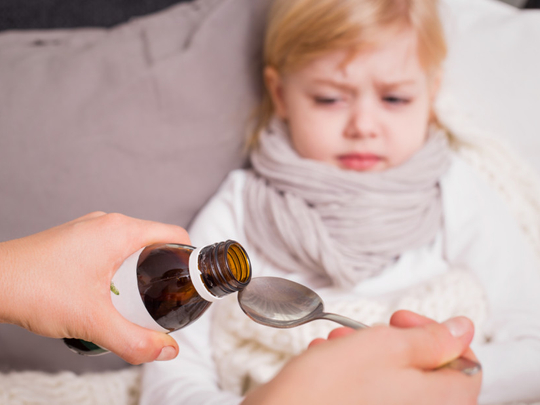
“Love, and a cough, cannot be hid,” the English metaphysical poet George Herbert wrote 400 years ago. It can be hard on parents to live with a child who keeps coughing — sometimes maybe harder on the parents than on the child.
I saw a 2-year-old recently whose mother was worried about a cough that had been there for more than a week. It bothered her son mostly in the evenings, she reported. He was running happily around the clinic exam room, and I hadn’t heard him cough once. But his mother was clearly distressed as she described — and tried to imitate — the staccato noises that occasionally came from his room at bedtime. Isn’t there something you can give him that will make it go away, she asked.
Although it is deeply frustrating to parents who want quick solutions, with a child this young who is otherwise well, the best response may be to wait for the cough to go away on its own.
Coughs are one of the most common reasons for both adults and children to seek medical care, and as a paediatrician, part of my job is to worry about what it means when a cough sticks around. Coughing is the reflex response of the airways to anything irritating, a useful defence that can help a child get rid of everything from pollutants to microbes to mucus. And a great majority of children who have coughs that hang on after colds or other viral infections don’t need any treatment beyond a certain amount of patience and maybe — if they are over a year old — a spoonful of honey now and then. (We don’t give honey to infants under a year for fear of infant botulism, a rare but potentially fatal illness.)
In recent years, paediatricians have had to argue against the dubious benefits of over-the-counter cough medications for young children. But not all persistent coughs are equal, and sometimes children do need more tests, or more medications.
When a cough doesn’t seem to be getting better, it’s worth paying attention to the pattern of coughing, and to the character of the cough itself. Dr Anne Chang is a senior paediatric pulmonologist in Brisbane, Australia, and the head of the child health division at Menzies School of Health Research in Darwin. Her research has included extensive reviews of chronic coughs in children, and the development of clinical protocols for evaluating and treating those coughs that last more than four weeks.
“The most common cause of cough where parents seek medical attention is acute cough related to upper respiratory infections,” she said. Most such coughs resolve in seven days, but in some children they can persist for several weeks.
“In the majority of cases, we tell parents not to worry if the child looks well,” unless the cough lasts for four weeks, she said.
Mind you, for small children in the winter, especially if they’re in preschool or day care (or have older siblings bringing home infections from elementary school), those four weeks could bring the onset of a new and different upper respiratory infection with its attendant cough and congestion; this contributes to the frustration of parents who feel the child has been unwell for a very long time.
Chang emphasised that the quality of the cough is important; a dry cough is generally less worrisome for infection than a wet cough, and any child with (or without) any kind of cough who looks unwell and especially who is having any trouble breathing should definitely see a doctor; breathing trouble can show up as rapid breathing, or as the chest muscles around the ribs tugging in with each breath. Those who study coughs in children also distinguish the barking cough of croup, and the paroxysmal cough of whooping cough, with or without its characteristic whoop.
Chang and her colleagues found that some children with prolonged wet coughs had bacteria in their lungs, and were suffering from a syndrome called protracted bacterial bronchitis, which gets better with a two-week course of antibiotics.
The usual work-up for chronic cough often starts with a chest X-ray and a test called spirometry, which measures the volume of inhaled and exhaled air. There are several different specialities with expertise around coughs, including paediatric pulmonologists, allergist-immunologists and otolaryngologists, which reflects the many reasons a child might be coughing, beyond that past infection; you worry about young children who may have choked or inhaled a foreign object, you worry about asthma, which in some children shows up as cough rather than wheeze, and a long list of other causes.
Dr Alan Goldsobel, a paediatric allergist immunologist who is an adjunct clinical professor at Stanford, and the author of a 2010 review article on coughing in children, said: “I always teach, if it’s a wet cough, think about antibiotics, if it’s a dry cough, think more about asthma.” A young child who is coughing through the night, he said, should raise the question of asthma.
However, if the cough doesn’t respond promptly to asthma medications, the child should be re-evaluated for other possible causes.
Studies of over-the-counter cough (and cold) medications for children have not shown that they are any more effective than placebos, and there have been plenty of problems with side effects and overdoses, especially in younger children, so the American Academy of Pediatrics recommends against using such medications in children under 4 years old, with many experts saying 6.
That is sometimes a hard message for parents to hear, perhaps because they remember being dosed with cough syrup themselves when they were young, and perhaps just because it’s natural to want to give something to a sick child that might possibly bring relief. Even humidifiers, once standard, have come under criticism as possible sources of mould.
Dr Richard Irwin, a pulmonologist who is a professor of medicine and nursing at the University of Massachusetts in Worcester and the editor of the journal “Chest”, where cough guidelines are published, said, “These medicines which you buy over the counter really are of dubious benefit at best and they can be very dangerous in young children.”
Studies have shown that parents are profoundly distressed when their children suffer from those persistent coughs, Chang said. “We found the parents reported their quality of life is as bad as parents of children with cardiac disease or severe GI problems.” Parents worry about the child’s sleep, she said, about the possibility that coughing may cause long-term damage, and of course, about some underlying disease. Even if the cough does not seem to be dangerous, she said, “when doctors take parents seriously, they often feel a sense of relief”.
Old-fashioned methods are still worth a try: parents can attempt to soothe a coughing child with a favourite book, a cosy blanket and a bowl of chicken soup.
–New York Times News Service













